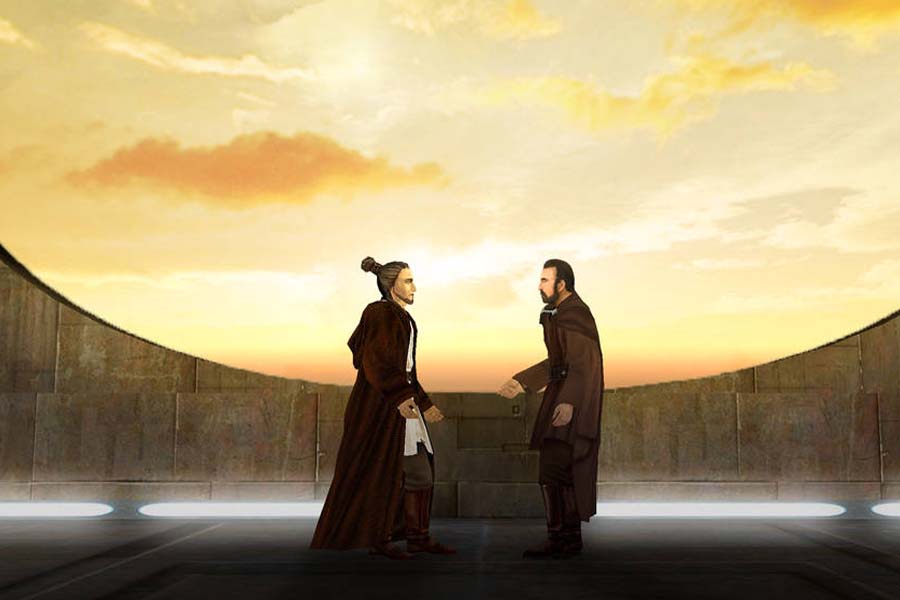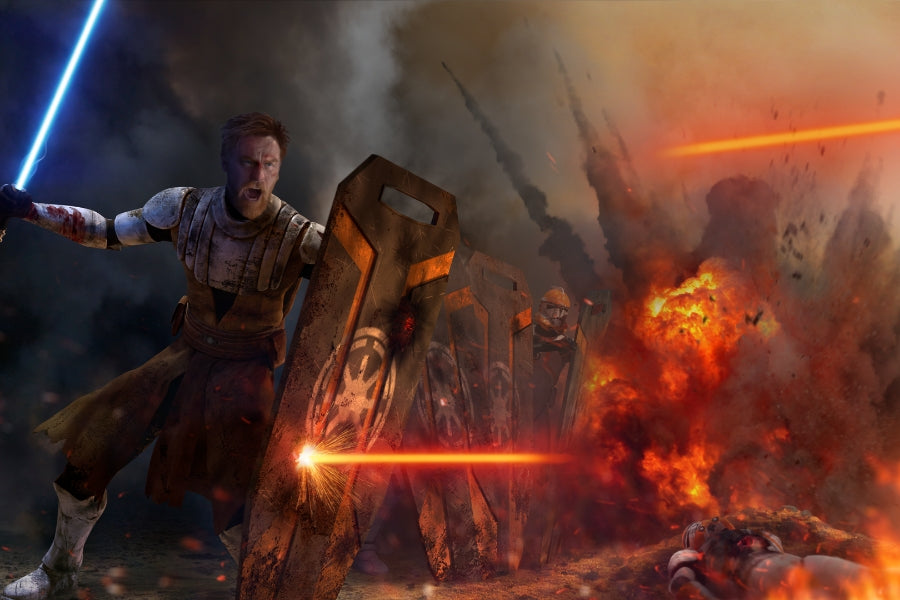As a major character in Star Wars, Obi-Wan has attracted many fans with his lightsaber and personal charm. Obi-Wan Kenobi's deeds have also attracted many people's attention, especially Obi-Wan's death. His death is not a failure. In this article, we analyze in detail the significance of Obi-Wan's death and the reasons behind it.
Carefully planned sacrifice
In "A New Hope", when Obi-Wan Kenobi faced Darth Vader on the Death Star, it was far more than an ordinary lightsaber duel. Obi-Wan had trained Anakin Skywalker and witnessed his fall to the dark side. Facing Darth Vader, the Sith Lord feared by the whole galaxy, the pressure Obi-Wan faced was undoubtedly enormous.
Obi-Wan Kenobi did not die because of his suppressed strength. As he dueled with Darth Vader on the Death Star, Obi-Wan realized that there was no winner in this battle. Therefore, he clarified the future in the end to ensure Luke Skywalker's survival. When he saw Luke looking at him face to face, everything became clear. His mission was not to destroy Vader, but to protect the future, to protect Luke, the son of the new star who could stop Vader.

At the last moment, Obi-Wan raised his lightsaber and closed his eyes. He weighed his options and finally chose a path beyond death. Obi-Wan allowed Vader to knock him down, buying time for Luke and others to escape. He knew that if Luke was captured or killed, Vader would never be saved, and the light would be buried in darkness forever. Therefore, Obi-Wan sacrificed his life in exchange for the continuation of hope.
The mystery of Obi-Wan's body disappearing
One of the most shocking moments of Obi-Wan Kenobi's death was that he was there, calm and ready to go, and the next second, only his empty robes and lightsaber were left. So much so that some people thought that Obi-Wan was faking his death and did not really die, but escaped.

In fact, it was because Obi-Wan mastered a skill that few Jedi Knights mastered, which allowed him to remain conscious after death. This ability to become one with the Force was first discovered by Obi-Wan's former master, Qui-Gon Jinn. Although Qui-Gon was unable to complete his training before his death, he laid the foundation. During his years of exile on Tatooine, Obi-Wan learned this technique through deep meditation and communion with the Force, which allowed Obi-Wan to exist and guide Luke in a whole new way.
Yoda later followed the same path, disappearing after his death in Return of the Jedi. Luke Skywalker also mastered this ability in his final moments on the planet Ahch-To in The Last Jedi.
Becoming a Force Ghost
Obi-Wan Kenobi's death was not the end of his influence. He became one with the Force and returned as a Force Ghost, a rare form that allows him to continue to guide those who are still alive. Rather than fading into memory, Obi-Wan is an active presence in Luke Skywalker's journey, appearing in moments of need and quietly shaping the fate of the galaxy.
During the Battle of Yavin, as Luke prepared to fire the cannonball that would destroy the Death Star, Obi-Wan’s voice echoed through the Force: “Use the Force, Luke.” Obi-Wan’s words prompted Luke to trust his instincts, abandon aiming, and rely solely on the Force. Ultimately, the Rebellion achieved its first major victory.

But Obi-Wan’s influence went far beyond that, and he continued to be present throughout Luke’s journey, especially as the young Jedi faced doubt, danger, and decisions that would determine the future of the galaxy. On Hoth, Obi-Wan’s spirit appeared to Luke when he was weak and injured, telling him to go to Dagobah to train with Yoda, guidance that changed the course of Luke’s life.
Even as Luke trained on Dagobah, Obi-Wan’s presence lingered in his mind. His spirit stood alongside Yoda, offering him encouragement and guidance. While he could not fight for Luke or make choices for him, his role as a mentor was still important.
Impact on Luke Skywalker's Journey
Obi-Wan Kenobi's death lit a spark of fire inside Luke Skywalker. In A New Hope, Luke was still just a farm boy with dreams of adventure. Witnessing Obi-Wan sacrifice himself was a wake-up call. This wasn't just a fight against the Empire, it was a fight for something greater. From that moment on, Luke's path shifted. He was no longer just drifting with the flow of the world, but moving toward a destiny that Obi-Wan firmly believed he could fulfill.
The Meaning of Obi-Wan's Sacrifice
Obi-Wan Kenobi's death is one of the most powerful themes in Star Wars. From the beginning of the saga, characters have faced choices that test their willingness to give up everything for a cause greater than themselves. This philosophy is most clearly demonstrated in action when Obi-Wan confronts Darth Vader despite knowing that it will cost him his life.
He doesn't fight to win, but to protect. Obi-Wan knows that by attracting Vader's attention, he can give Luke and the others a chance to escape. Yet his sacrifice also holds emotional and moral complexity. Obi-Wan wasn’t perfect, he made mistakes, and his final act was one of both redemption and resolution. Not by taking more lives, but by giving his own. This moral nuance gives Star Wars its depth.
Obi-Wan’s death permeates the entire saga, and his death lays the foundation for those who followed. Luke later risks everything to save his father. Leia stays behind to protect the Resistance. Even Anakin ultimately gives his life to destroy the Emperor, following the example Obi-Wan sets.
The Legacy of the Jedi Order
Obi-Wan Kenobi’s actions on the Death Star resonate far beyond his death. His sacrifice sets a powerful example for future generations of Jedi, especially in how they balance their duty with the harsh realities of the galaxy. Obi-Wan’s actions show that the true power of the Jedi is not only in their fighting prowess, but also in their spiritual core.
At its core, Obi-Wan’s sacrifice is a manifestation of Jedi wisdom. Throughout the prequel trilogy, we see him as a staunch figure in the Jedi Order. But it was in A New Hope that Obi-Wan showed his wisdom by allowing himself to die, realizing that his role in the galaxy was complete and that it was time to set up Luke's future.

Obi-Wan's death also reinforced the belief in sacrifice for others. In a galaxy constantly embroiled in conflict, Jedi often face difficult decisions that test their resolve. Obi-Wan's act of self-sacrifice is a living testimony to the ideals of the Jedi Order. He demonstrated that to truly protect the galaxy, sometimes one must give up one's desires, and even one's life, for the sake of others.
Furthermore, Obi-Wan's legacy lives on in the ongoing struggle between light and dark. His teachings, both directly and indirectly, have influenced future generations of Jedi. Despite the darkness that enveloped the galaxy, his devotion to the light side remained a beacon of hope. Even after his death, Obi-Wan's guidance shaped key moments in Luke's journey, especially in the fight against the growing dark forces of the Empire and later the First Order.
Conclusion
Obi-Wan's influence is far-reaching and has profoundly affected the nature of the Jedi Knight. Obi-Wan's legacy has inspired many Jedi Knights and made them shoulder their responsibilities. Obi-Wan's death represents the endless struggle against darkness and has become a guiding light for the Jedi Knights.
FAQs
1. How did Obi-Wan Kenobi die in A New Hope?
Obi-Wan was struck down during his duel with Darth Vader on the Death Star, but he disappeared after his death and became one with the Force.
2. Why did Obi-Wan let Vader kill him?
Obi-Wan planned his own death so that he could help Luke and the others escape and so that he could guide Luke mentally through the Force.
3. Why did Obi-Wan's body disappear after his death?
Obi-Wan mastered the art of becoming one with the Force, causing his body to disappear and become a Force ghost to guide Luke Skywalker.
4. Did Obi-Wan's death have an impact on Darth Vader?
Although Vader seemed grim at the time, Obi-Wan's death did stir up buried emotions from his past as Anakin Skywalker, which affected his redemption.
5. How did Obi-Wan's death affect Luke Skywalker?
Obi-Wan's death motivates Luke to grow up, inspires him to Jedi training, and pushes him to take on the mission of overthrowing the Empire.
6. What does Obi-Wan's death symbolize in the larger story of Star Wars?
It embodies the Jedi's ideal of self-sacrifice and reinforces the theme of passing on wisdom to the next generation.





